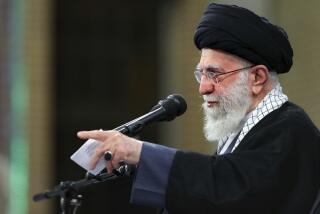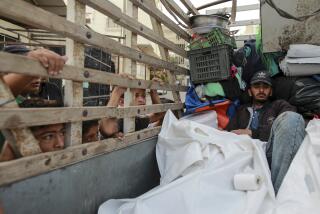Israel Army to Continue Using Force in Protests : Chief of Staff Avoids Accusations of Excessive Violence, Maintains Guidelines; 2 Arabs Killed
- Share via
JERUSALEM — The Israeli military chief of staff, Lt. Gen. Dan Shomron, said Tuesday that his troops will continue using physical force, including beatings, against Palestinian protesters in making arrests or upon encountering resistance.
But Shomron, in a letter to troop commanders that restated previous policy, said that no one under arrest and no one who is not physically resisting should be beaten.
For the record:
12:00 a.m. Feb. 25, 1988 For the Record
Los Angeles Times Thursday February 25, 1988 Home Edition Part 1 Page 2 Column 5 Metro Desk 1 inches; 20 words Type of Material: Correction
In a caption in Wednesday’s editions of The Times, Shimon Peres’ post in the Israeli Cabinet was given incorrectly. He is the foreign minister.
Defense Ministry sources said the letter set out no new guidelines for implementing policy and did not deal specifically with charges that the army has engaged in excessive violence.
The letter followed by one day a ruling by Atty. Gen. Yosef Harish that it is “forbidden to use force to punish or humiliate” protesters and that soldiers are required by law to disobey any contrary order.
Army sources said, meanwhile, that two more Palestinians, both adolescents, had been shot and killed in separate incidents on the West Bank. Both incidents took place Monday night. They raised the Palestinian death total to 61 since the uprising began Dec. 9.
Defense Ministry officials would not disclose the specific contents of the directive. They said Shomron issued no new orders. Standing orders, they said, ban the use of excessive force and permit beatings only to disperse protesters resisting efforts at dispersal.
Military spokesmen have consistently maintained that although some soldiers have committed excesses, such incidents have been isolated exceptions.
Atty. Gen. Harish said he issued the ruling, which is binding on the Israeli government, after being flooded with complaints that soldiers had beaten prisoners after they had been arrested or used excessive force, even brutality, to put down demonstrations.
“The number of complaints raises the suspicion that classifying these incidents as exceptions no longer reflects reality,” Harish said in a letter to Defense Minister Yitzhak Rabin. Harish demanded that Rabin issue new orders incorporating his findings.
‘Not a Response’
Etien Haber, a spokesman for Rabin, confirmed that the Shomron letter had been distributed but denied that it was a confirmation of the Harish findings or a response to the attorney general’s ruling.
“It was prepared a week ago,” Haber said, “and is not a response to the attorney general.” He added that the chief of staff issues directives dealing with the behavior of soldiers “twice a year, and this is one of those.”
The issue of excessive force came under new scrutiny last week when the army confirmed that soldiers had buried four Arab youths alive, using a bulldozer. Nearby residents rescued the four and filed complaints with the military, which has arrested at least three soldiers in connection with the incident.
And military spokesmen also confirmed Tuesday that an investigation is under way into charges that soldiers had beaten and buried two Gaza Strip youths on a beach near Khan Yunis. The two were rescued and are hospitalized in Khan Yunis, according to Palestinian sources.
“If it is true, the people responsible will be punished,” a military spokesman said.
Demonstrations Planned
Tuesday was generally quiet on the West Bank and in the Gaza Strip. Leaders of the uprising had called for a day of fasting in preparation for general strikes today and Thursday and increased demonstrations timed to coincide with the arrival of Secretary of State George P. Shultz.
Despite the call for a hunger strike and a demand that sidewalk food sellers restrict their operations to three hours a day, food markets in Ramallah and East Jerusalem appeared to be doing business as usual.
One of the Monday night deaths aroused special interest because of what a military source called the “high possibility” that an Israeli settler had killed the victim.
Settler Arrested
According to the source’s account, 13-year-old Rawda Najeeb was standing in the doorway of her home in Baqa Sharqiyah when she was shot in the chest during a demonstration. The source said that no soldiers were in the area Monday night and that “an Israeli citizen, not an Arab, had been arrested.” There is a “high probability” that the killer was a Jewish settler, the source said.
Residents of Jewish settlements established on the predominantly Arab West Bank are frequent targets of stones and gasoline bombs and often retaliate by raiding Palestinian villages.
The other Monday victim, also 13, was Mahmoud Niman Hasheyeb. He died, an army spokesman said, when soldiers who felt their lives endangered by stones and gasoline bombs opened fire during a demonstration in the village of El Yamun. The youth was hit in the chest.
More to Read
Sign up for Essential California
The most important California stories and recommendations in your inbox every morning.
You may occasionally receive promotional content from the Los Angeles Times.









